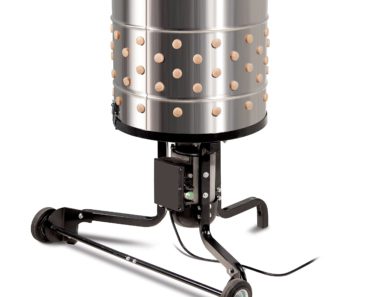Contents
- 1 How Much Do You Feed Chickens: The Definitive Guide to Proper Feeding Practices
- 2 How Much Do You Feed Chickens: A Guide for Chicken Owners
- 3 Factors to Consider When Determining the Amount of Chicken Feed
- 4 Tips for Feeding Chickens the Right Amount
- 5 Potential Issues with Overfeeding or Underfeeding Chickens
- 6 FAQ
- 6.1 How much feed should I provide to my chickens daily to ensure proper nutrition and healthy growth?
- 6.2 What is the recommended feeding schedule for chickens, and how often should I offer them food?
- 6.3 Are there any specific guidelines or calculations to determine the exact amount of feed needed per chicken based on their age, breed, and activity level?
- 6.4 Related Posts

Feeding your chickens is crucial for their health and productivity. Join me as we explore proper feeding techniques, essential nutrients for their diet, and tips for maintaining a balanced feeding schedule. Let’s ensure our feathered friends are happy and well-nourished!
How Much Do You Feed Chickens: The Definitive Guide to Proper Feeding Practices
Feeding chickens is a crucial part of raising healthy and productive birds. Knowing how much to feed them is essential to ensure they get the right nutrition without wasting food or overfeeding.
1. Determine the appropriate amount: The amount of feed you should give your chickens depends on various factors such as their age, size, breed, activity level, and whether they are laying eggs or not. Consulting a poultry nutritionist or following guidelines provided by reputable feed manufacturers can help you determine the appropriate daily amount of feed for your flock.
2. Provide a balanced diet: Chickens require a balanced diet that includes protein, carbohydrates, fats, vitamins, and minerals. The exact ratios may vary depending on their stage of life, but generally, a good quality commercial poultry feed will meet their nutritional requirements. Supplementing with kitchen scraps or treats can be done in moderation, but it should not replace their main feed.
3. Consider free-range or pasture feeding: If your chickens have access to a pasture or free-range area, they will spend time foraging and eating insects, grass, and other natural foods. In such cases, the amount of feed you provide may be reduced as they are getting nutrients from other sources. However, it’s important to monitor their weight and body condition to ensure they are not becoming undernourished.
4. Avoid overfeeding: Overfeeding can lead to obesity, health issues, and wasted food. Chickens only eat what they need, so it’s important to monitor their intake and adjust accordingly. Regularly assess their body condition and adjust the feeding amount if necessary.
5. Water is essential: Alongside proper feeding, providing clean and fresh water is crucial for your chickens’ health. Water should always be available, especially during hot weather or when feeding high-protein diets.
Determining the appropriate amount of feed for your chickens requires considering their specific needs and following expert guidelines. Providing a balanced diet, monitoring their intake, and ensuring access to clean water are key factors in proper feeding practices for healthy and productive chickens.
How Much Do You Feed Chickens: A Guide for Chicken Owners
Factors to Consider When Determining the Amount of Chicken Feed
Feeding chickens the right amount of feed is crucial for their health and productivity. Here are some factors to consider when determining how much to feed your chickens:
- Age and Life Stage: Chickens have different nutritional requirements at each life stage. Chicks require starter feed, while adult laying hens need layer feed. Adjust the quantity based on these requirements.
- Breed and Size: Bigger breeds tend to eat more than smaller ones. Consider the breed and size of your chickens when determining their feed requirements.
- Activity Level: Highly active chickens may require more feed than sedentary ones. Take into account the activity level of your chickens to ensure they receive adequate nutrition.
- Environment and Weather Conditions: Extreme temperatures or changes in climate can affect the feeding habits of chickens. Adjust the feed quantity accordingly during hot or cold weather.
Tips for Feeding Chickens the Right Amount
Feeding chickens the appropriate amount of feed ensures their well-being and optimal egg production. Consider the following tips:
- Measure the Feed: Use a measuring cup or scale to accurately measure the feed quantity and avoid overfeeding or underfeeding your chickens.
- Observe Consumption: Monitor your chickens’ feed consumption regularly. Make adjustments if they are consistently leaving leftovers or if they appear hungry between meals.
- Provide Fresh Water: Access to clean and fresh water is essential for chickens’ health and digestion. Ensure water is always available.
- Consult with Experts: If you are unsure about the amount of feed to provide, consult with a poultry nutritionist or veterinarian to get expert advice specific to your chicken’s needs.
Potential Issues with Overfeeding or Underfeeding Chickens
Overfeeding or underfeeding chickens can lead to various problems. Some potential issues include:
- Obesity and Health Risks: Overfeeding can lead to obesity and related health problems such as fatty liver disease and reduced egg production.
- Malnutrition: Underfeeding can result in malnutrition that affects overall health, egg quality, and immune system function.
- Behavioral Problems: Inadequate feeding may cause chickens to exhibit aggressive or frustrated behavior. It can also lead to cannibalism among the flock.
- Reduced Egg Production: Both overfeeding and underfeeding can impact egg production negatively. Providing the right amount of feed promotes optimal egg-laying.
FAQ
How much feed should I provide to my chickens daily to ensure proper nutrition and healthy growth?
Proper nutrition is essential for the healthy growth and development of chickens. The amount of feed you should provide to your chickens depends on several factors, including their age, breed, and purpose (meat or egg production).
For growing chicks, a good guideline is to provide approximately 1/4 to 1/3 pound (113-151 grams) of starter feed per chick per day. As they grow older, you can gradually increase the amount of feed to meet their changing nutritional needs.
For adult laying hens, you should provide about 1/4 to 1/3 pound (113-151 grams) of layer feed per hen per day. Layer feed is specially formulated to support egg production and contains higher levels of calcium.
It’s important to monitor your chickens’ appetite and adjust the amount of feed accordingly. If they consistently leave feed uneaten, you may be providing too much, and if they finish it quickly and still seem hungry, you may need to increase the amount.
In addition to providing the appropriate quantity of feed, make sure to offer fresh water at all times. Chickens require constant access to clean water for proper digestion and hydration.
Remember that these are general guidelines, and individual needs may vary. It’s always a good idea to consult with a veterinarian or poultry nutritionist to ensure you’re meeting your specific chickens’ nutritional requirements.
What is the recommended feeding schedule for chickens, and how often should I offer them food?
The recommended feeding schedule for chickens varies depending on their age:
1. Chicks (0-6 weeks old): Provide a starter feed specifically formulated for chicks. Offer food free-choice and make sure it is always available to them.
2. Pullets (6-20 weeks old): Switch to a grower feed designed for young chickens. Continue offering food free-choice, ensuring they have access to it throughout the day.
3. Laying Hens (20+ weeks old): Transition to a layer feed that contains the appropriate levels of calcium for egg production. Offer food free-choice, but consider using a timed feeder if you want to regulate their intake.
How often to offer them food:
Chickens should have access to food all day, as they prefer to eat small amounts frequently. However, be cautious not to overfeed them, as obesity can lead to health issues. Additionally, it’s important to monitor their appetite and adjust the amount of food offered accordingly.
Aside from their regular feed, it’s also beneficial to provide fresh water, grit, and occasional treats such as fruits, vegetables, and mealworms.
Are there any specific guidelines or calculations to determine the exact amount of feed needed per chicken based on their age, breed, and activity level?
Yes, there are guidelines and calculations that can help determine the amount of feed needed per chicken based on their age, breed, and activity level.
The first step is to determine the recommended daily feed intake (DFI) for your chickens. This can vary depending on the breed and age of the chickens. For example, young growing chickens require more feed compared to adult chickens. You can find specific DFI recommendations from feed manufacturers or consult poultry nutritionists.
Once you have the DFI, you can calculate the total weekly feed requirement by multiplying the DFI by 7. This will give you the total amount of feed needed per week.
To distribute this feed throughout the week, you can divide the weekly feed requirement by the number of days in the week to get the daily feed requirement. This ensures that the chickens receive a consistent amount of feed every day.
In addition to age and breed, considering the activity level of your chickens is important. If they are more active, such as free-ranging or engaged in intensive physical activity, they may require more feed to meet their energy needs.
However, it’s important to note that these calculations provide general guidelines and may need adjustments based on individual chicken’s health, body condition, and environmental factors. Monitoring the chickens’ body weight and condition can help determine if any adjustments need to be made to their feed intake.
Always consult with a poultry nutritionist or veterinarian for more precise guidance tailored to your specific flock’s needs.
Determining the appropriate amount of food to feed your chickens is crucial for their health and productivity. Feeding them the right quantity ensures that they receive the necessary nutrients without being overfed. Remember to consider various factors such as their age, breed, and activity level when establishing their dietary requirements. Monitoring their body condition and adjusting the portion sizes accordingly can help prevent issues like obesity or malnutrition. Providing a balanced diet with high-quality feeds and supplementing it with fresh fruits, vegetables, and protein-rich treats can contribute to the overall well-being of your flock. Always consult with experts or veterinarians for personalized advice based on your specific chicken-raising goals. By striving to meet their nutritional needs, you can enjoy happy, healthy, and thriving chickens.






